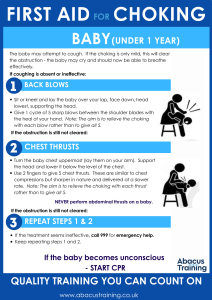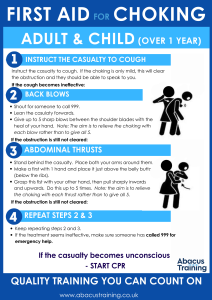Choking: Risks and Prevention
What is Choking?
Choking occurs when an object—usually food—becomes lodged in the airway, blocking the flow of air and preventing normal breathing. It can happen to anyone at any time, however it is particularly common in children and older adults.
Who is at Risk?
Between 2018-2022, 1399 deaths in the UK were caused by choking – with 1097 by food substances, and 302 with non-food objects.
Research reveals that elderly people are the most at-risk of choking to death. There are a number of reasons for this, for example:
- eating too fast,
- attempting to swallow large portions of food without chewing (due to having fewer teeth or ill-fitting dentures),
- difficulty with swallowing (due to naturally having less saliva as we age).
Young children are also very vulnerable as they do not fully master the chewing/swallowing technique until 4-6 years of age. Accidental choking is more likely to occur in one’s early years where young children often use their mouths to experience foods, and other objects, around them.
Key Signs of Choking
It’s important to recognise the signs of choking so you can act quickly to help someone in need:
- Difficulty breathing or noisy breathing
- Inability to talk or cough
- Panic or distress
- Grasping the throat (universal sign of choking)
- Face turning red, blue, or pale
- Loss of consciousness in extreme cases
If you notice these signs, it’s critical to act immediately.
What food causes the most choking deaths?
- Chicken with bones
- Marshmallows
- Fruit – especially apples and other hard fruits
- Whole grapes
- Chunky peanut butter
- Popcorn
- Hard-boiled sweets
- Crackers or rice cakes
- Uncooked vegetables
- Cheese chunks
- Bread
- Chewing gum
Treatment
Sadly, research reveals that only 44% of people know how to give basic back blows to someone choking.
Our First Aid for Choking step-by-step guides for Adult & Child and Baby are available to download.


Tips to Prevent Choking
Whether you’re caring for a child, an elderly relative, or someone with swallowing difficulties, there are several steps you can take to help prevent choking:
-
Cut food into small pieces– especially important for young children/elderly. Smaller, bite-sized pieces are less likely to block the airway.
-
Supervise meals – children should always be supervised while eating, and adults with swallowing disorders should eat sitting upright and in a calm, distraction-free environment.
-
Encourage thorough chewing – teach children and adults to chew food slowly and thoroughly before swallowing.
-
Avoid high-risk foods: Certain foods, such as whole grapes, and hard sweets, are more likely to cause choking. Be mindful of these and cut them into smaller pieces or avoid them altogether for younger children.
-
Stay hydrated: Dehydration can make swallowing more difficult. Encourage adequate fluid intake to keep the swallowing mechanism functioning properly.
-
Seek professional help: If someone is experiencing difficulty swallowing, it’s important to consult with a healthcare professional to assess the issue and recommend treatment.
With the right knowledge and precautions, we can reduce the risks of choking and ensure the safety and well-being of those at risk.
Furthermore, if you would like to learn first aid and find out how to respond in an emergency, please get in touch. Also, to find out more about our training courses and how they can help you – click here: .https://abacustraining.co.uk/health-safety-training-courses/first-aid-training-courses/

